Resolution on Manipur
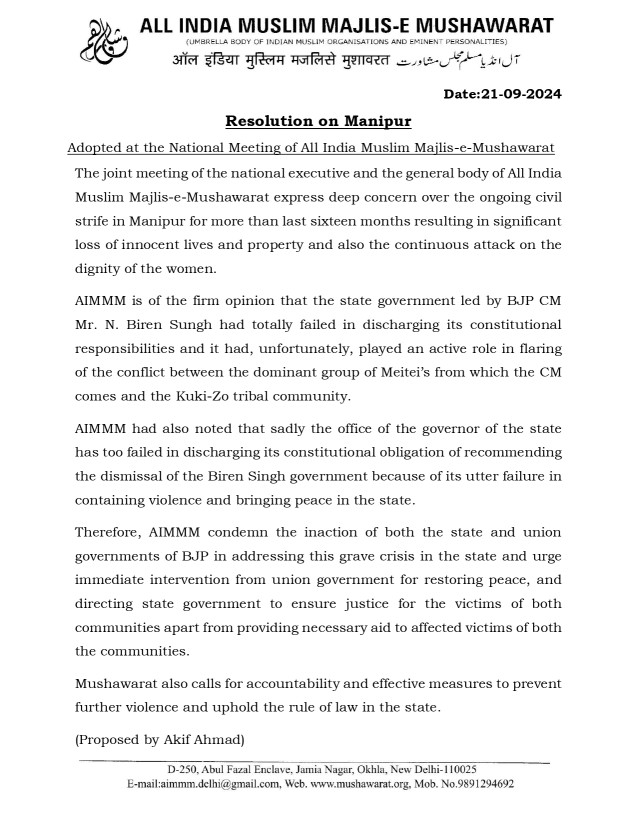
Adopted at the National Meeting of All India Muslim Majlis-e-Mushawarat Date: 21st September, 2024 The joint meeting of the national executive and the general body of All India Muslim Majlis-e-Mushawarat express deep concern over the ongoing civil strife in Manipur for more than last sixteen months resulting in significant loss of innocent lives and property and also the continuous attack on the dignity of the women. AIMMM is of the firm opinion that the state government led by BJP CM Mr. N. Biren Sungh had totally failed in discharging its constitutional responsibilities and it had, unfortunately, played an active role in flaring of the conflict between the dominant group of Meitei’s from which the CM comes and the Kuki-Zo tribal community. AIMMM had also noted that sadly the office of the governor of the state has too failed in discharging its constitutional obligation of recommending the dismissal of the Biren Singh government because of its utter failure in containing violence and bringing peace in the state. Therefore, AIMMM condemn the inaction of both the state and union governments of BJP in addressing this grave crisis in the state and urge immediate intervention from union government for restoring peace, and directing state government to ensure justice for the victims of both communities apart from providing necessary aid to affected victims of both the communities. Mushawarat also calls for accountability and effective measures to prevent further violence and uphold the rule of law in the state. (Proposed by Akif Ahmad)
ہندوستانی معیشت اورمرکزی بجٹ کے فلاحی منصوبوں میں مسلمانوں کے لیے دم توڑتے مواقع پر قرارداد
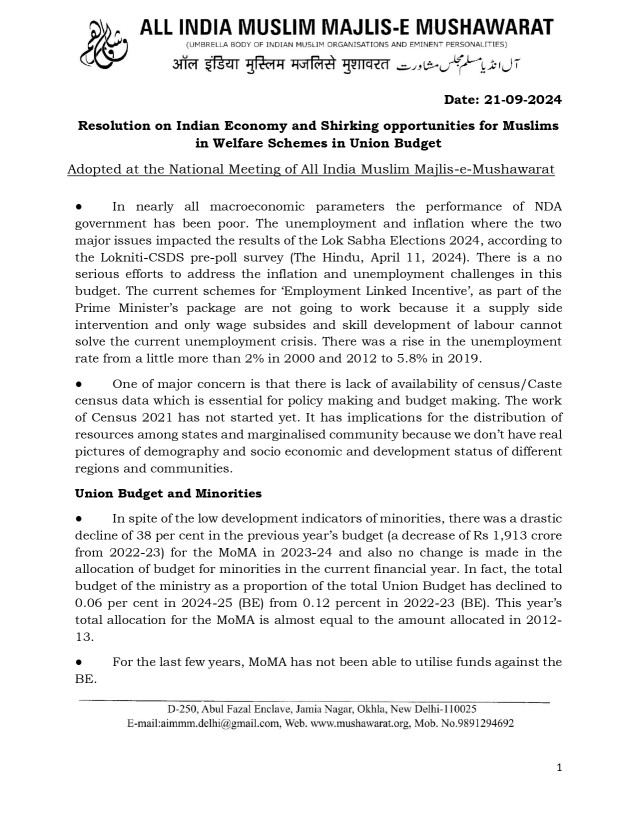
آل انڈیا مسلم مجلس مشاورت کے قومی اجلاس میں منظور کی گئی Date: 21st September, 2024 این ڈی اے حکومت کی کارکردگی تقریباً تمام میکرو اکنامک پیرامیٹرز میں خراب رہی ہے۔ لوک نیتی-سی ایس ڈی ایس(CSDS) پری پول سروے (دی ہندو، اپریل 11، 2024) کے مطابق، بےروزگاری اور مہنگائی دو بڑے مسائل نےجہاں لوک سبھا انتخابات 2024 کے نتائج کو متاثر کیا،وہیںاس بجٹ میں مہنگائی اور بے روزگاری کے چیلنجز سے نمٹنے کی کوئی سنجیدہ کوشش نہیں کی گئی۔ وزیر اعظم کے پیکیج کے حصے کے طور پرایمپلائمنٹ لنکڈ انسینٹیو(روزگارپر مبنی حوصلہ افزائی) کے لیے موجود اسکیمیں کام نہیں کر رہی ہیں کیونکہ یہ سپلائی سائیڈ مداخلت ہے اور صرف اجرت میں کمی اورلیبر کی ہنر مندی موجودہ بے روزگاری کے بحران کو حل نہیں کرسکتی۔ بے روزگاری کی شرح میں 2000 اور 2012 میں 2 فیصد سے تھوڑا سا اضافہ ہوا جو 2019 میں 5.8 فیصد تک پہنچ گیا۔ ایک بڑی تشویش یہ ہے کہ مردم شماری/ذات برادری کی مردم شماری کے اعداد و شمار کی دستیابی کی کمی ہے جو پالیسی سازی اور بجٹ سازی کے لیے ضروری ہے۔ مردم شماری 2021 کا کام ابھی شروع نہیں ہوا۔ ریاستوں اور پسماندہ طبقات کے درمیان وسائل کی تقسیم پر اس کے مضمرات کارفرماہوتے ہیں لیکن ہمارے پاس مختلف خطوں اور برادریوں کی آبادی اور سماجی اقتصادی اور ترقیاتی حیثیت کی حقیقی تصویریں نہیں ہیں۔ یونین بجٹ اور اقلیتیں اقلیتوں کی ترقی کے اشاریےنیچےآئے ہیں،اس کے باوجود 2023-24میںوزارت اقلیتی امور کے پچھلے سال کے بجٹ میں2022-23سے 1913کروڑ روپے کی کمی کردی گئی(جو 38 فیصد کی زبردست تخفیف ہے) اور اس باراس میں بھی کوئی تبدیلی نہیں کی گئی۔ رواں مالی سال میں اقلیتوں کے لیے بجٹ مختص کرنے میں درحقیقت کل مرکزی بجٹ کے تناسب میں وزارت کا بجٹ 2022-23(BE) میں 0.12 فیصد سےگھٹ کر 2024-25 میں 0.06 فیصد رہ گیا ہے۔وزارت اقلیتی امور کے لیے اس سال کی کل رقم 2012-13میں مختص کی گئی رقم کے تقریباً برابر ہے۔ پچھلے کچھ سالوں سےوزارت اقلیتی امور بجٹ میں مختص رقم استعمال کی اہل نہیں ہے۔ وزارت اقلیتی امور کےبجٹ مختص رقوم میں کمی کی بڑی وجہ متعدد اسکیموں/ اداروں کا بند ہونا ہے جیسے اقلیتی طلبہ کے لیے مولانا آزاد نیشنل فیلوشپ، بیرون ملک مقیم طلبہ کے لیے تعلیمی قرضوں کے سود پر سبسڈی، مفت کوچنگ اسکیمیں، پری میٹرک کی کوریج میں تخفیف، کلاس 9-10 کے لیے اسکالرشپ، مولانا آزاد ایجوکیشن فاؤنڈیشن (MAEF)/بیگم حضرت محل اسکالرشپ اسکیم، اور مدارس اور اقلیتوں کے لیے اسکیمیں۔ بہت سی بڑی اسکیموں کے لیے مختص رقم میں بھی کمی آئی ہے جیسے میرٹ کم مینس، پری میٹرک اسکیم، مفت کوچنگ اور اس سے منسلک اسکیمیں، مدارس اور اقلیتوں کے لیے تعلیمی اسکیم، اور پردھان منتری جن وکاس کاریاکرم (PMJVK) مدارس اور اقلیتوں کے لیے تعلیمی اسکیم میں مرکزی حصہ میں کمی اور اس کے بعد اسکیم کے بند ہونے سے ریاستوں میں کئی سالوں سے اساتذہ کو اعزازیہ کی عدم ادائیگی کی وجہ سے مدارس میں بچوں کی تعلیم متاثر ہوئی ہے۔ جیسا کہ محکمہ سے متعلق قائمہ کمیٹی برائے سماجی انصاف( 2023-24)نے روشنی ڈالی ہےکہ اسکالرشپ سکیموں کے فنڈز کا ناقص استعمال، کوٹہ سسٹم کی وجہ سے فائدہ اٹھانے والوں کی ناکافی کوریج، فنڈز کی ناکافی اختصاصی کی وجہ سے کم یونٹ لاگت اور کچھ اسکیموں کو ختم بھی کردیاجاناقابل ذکرعوامل ہیں، طلباء کو وظائف کے طور پر دی جانے والی رقم ان کے تعلیمی اخراجات کو پورا کرنے کے لیے کافی نہیں ہےاور اقلیتوں کے لیے پری میٹرک، پوسٹ میٹرک اور میرٹ کم مینس اسکیموں میں اسکالرشپ کی یونٹ لاگت میں اسکیموں کے آغاز (2007-08)کے بعد سے نظر ثانی نہیں کی گئی ہے۔سفارشآل انڈیا مسلم مجلس مشاورت کا مطالبہ ہے کہ یونین بے روزگاری اور مہنگائی سے متعلق مسائل کو فوری طور پر حل کرے۔ مردم شماری/ذات کی مردم شماری جلد از جلد کرائی جائے۔ اقلیتوں کے تعلیمی حصول اور معاشی طور پر بااختیار بنانے میں محرومی کی سطح کو دیکھتے ہوئےوزارت اقلیتی امور کے لیے بجٹ میں مختص رقوم میں نمایاں اضافہ کیا جانا چاہیے۔ تمام اسکالرشپ اسکیموں کو مطالبہ پر مبنی بنایا جانا چاہیے اور والدین کی آمدنی سے متعلق اہلیت کے معیار میں نظرثانی کے ساتھ یونٹ کے اخراجات کو بڑھانے کے لیے اضافی مالی وسائل فراہم کیے جانے چاہیے۔ جو اسکیمیں بند کی گئی ہیں ان کو بحال کیا جائے۔ 15 نکاتی پروگرام کی روسے وسائل کی تقسیم مختلف شعبوں میں اقلیتی برادریوں کی متنوع ضروریات کے مطابق کی جانی چاہیے۔ تجویز کردہ:ڈاکٹر جاوید عالم خان، ایگزیکٹو ڈائریکٹرانسٹی ٹیوٹ آف پالیسی اسٹڈیز اینڈ ایڈوکیسی، نئی دہلی۔
Resolution on Indian Economy and Shirking opportunities for Muslims in Welfare Schemes in Union Budget

Adopted at the National Meeting of All India Muslim Majlis-e-Mushawarat Date: 21st September, 2024 ● In nearly all macroeconomic parameters the performance of NDA government has been poor. The unemployment and inflation where the two major issues impacted the results of the Lok Sabha Elections 2024, according to the Lokniti-CSDS pre-poll survey (The Hindu, April 11, 2024). There is a no serious efforts to address the inflation and unemployment challenges in this budget. The current schemes for ‘Employment Linked Incentive’, as part of the Prime Minister’s package are not going to work because it a supply side intervention and only wage subsides and skill development of labour cannot solve the current unemployment crisis. There was a rise in the unemployment rate from a little more than 2% in 2000 and 2012 to 5.8% in 2019. ● One of major concern is that there is lack of availability of census/Caste census data which is essential for policy making and budget making. The work of Census 2021 has not started yet. It has implications for the distribution of resources among states and marginalised community because we don’t have real pictures of demography and socio economic and development status of different regions and communities. Union Budget and Minorities ● In spite of the low development indicators of minorities, there was a drastic decline of 38 per cent in the previous year’s budget (a decrease of Rs 1,913 crore from 2022-23) for the MoMA in 2023-24 and also no change is made in the allocation of budget for minorities in the current financial year. In fact, the total budget of the ministry as a proportion of the total Union Budget has declined to 0.06 per cent in 2024-25 (BE) from 0.12 percent in 2022-23 (BE). This year’s total allocation for the MoMA is almost equal to the amount allocated in 2012-13. ● For the last few years, MoMA has not been able to utilise funds against the BE. ● The major reason behind the decline in the allocation of MoMA has been discontinuation of several schemes/institutions such as Maulana Azad National Fellowship for Minority students, Interest subsidy on educational loans for overseas students, Free coaching Schemes, limiting coverage of the Pre-Matric Scholarship for classes 9-10, closing the Maulana Azad Education Foundation (MAEF)/Begum Hazrat Mahal Scholarship Scheme, and the Scheme for Madrasas and Minorities. There has also been a decline in allocations for many major schemes, such as Merit Cum Means, Pre-Matric Scheme, Free Coaching and allied schemes, Education Scheme for Madrasas and Minorities, and the Pradhan Mantri Jan Vikas Karyakram (PMJVK). The decline in the central share in the Education Scheme for Madrasas and Minorities, and subsequent discontinuation of the scheme has affected the education of children in Madrasas due to non-payment of honoraria to teachers in the states for many years. ● As highlighted by the Departmentally Related Standing Committee on Social Justice – 2023-24, the scholarship schemes face several implementation issues with poor utilization of funds, inadequate coverage of beneficiaries due to the quota system, low unit costs due to inadequate allocations of funds, and also scrapping of some of the schemes. The amounts given to students as scholarships are not adequate to meet their educational expenses. The unit cost for scholarships in Pre-Matric, Post-Matric and Merit-cum-Means schemes for minorities has not been revised since the inception of the schemes (in 2007-08). Recommendation ● All India Muslim Majlis e Mushawarat demands that Union should address the issues related to unemployment and inflation with immediate effect. The ccensus/caste census should be conducted as soon as possible. The total budget allocation for MoMA should be increased significantly given the level of deprivation in the educational attainment and economic empowerment of minorities. All scholarship schemes should be made demand driven, and additional financial resources should be provided to enhance unit costs along with a revision in the eligibility criterion related to parental income. Schemes that have been discontinued should be revived. Under the 15 Point Programme, resource allocation should be made in line with the diverse needs of minority communities across different sectors. Dr Jawed Alam Khan, Executive Director Institute of Policy Studies and Advocacy, New Delhi
RESOLUTION ON HIJACKING OF MUSHAWARAT’s NAME FOR CREATING A PARALLEL OUTFIT
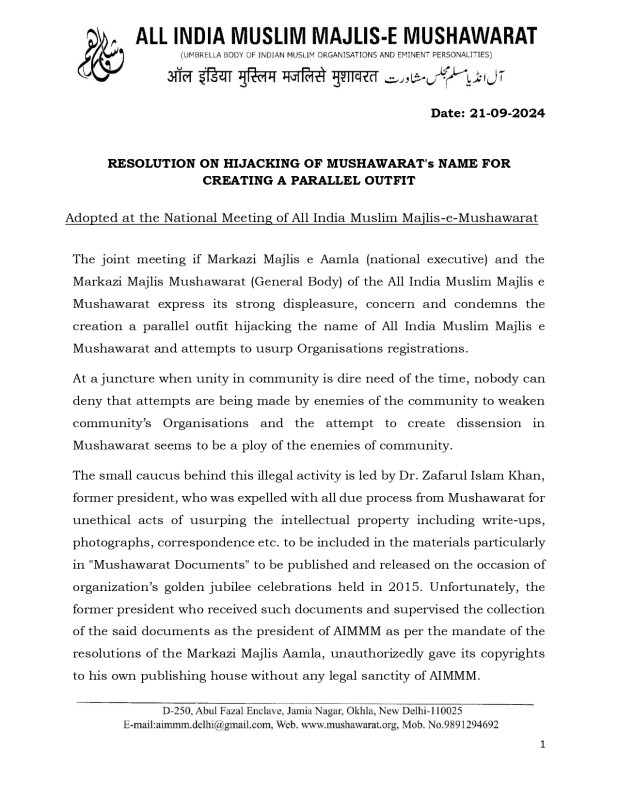
Adopted at the National Meeting of All India Muslim Majlis-e-Mushawarat Date: 21st September, 2024 The joint meeting if Markazi Majlis e Aamla (national executive) and the Markazi Majlis Mushawarat (General Body) of the All India Muslim Majlis e Mushawarat express its strong displeasure, concern and condemns the creation a parallel outfit hijacking the name of All India Muslim Majlis e Mushawarat and attempts to usurp Organisations registrations. At a juncture when unity in community is dire need of the time, nobody can deny that attempts are being made by enemies of the community to weaken community’s Organisations and the attempt to create dissension in Mushawarat seems to be a ploy of the enemies of community. The small caucus behind this illegal activity is led by Dr. Zafarul Islam Khan, former president, who was expelled with all due process from Mushawarat for unethical acts of usurping the intellectual property including write-ups, photographs, correspondence etc. to be included in the materials particularly in “Mushawarat Documents” to be published and released on the occasion of organization’s golden jubilee celebrations held in 2015. Unfortunately, the former president who received such documents and supervised the collection of the said documents as the president of AIMMM as per the mandate of the resolutions of the Markazi Majlis Aamla, unauthorizedly gave its copyrights to his own publishing house without any legal sanctity of AIMMM. After several unsuccessful attempts of the national executive and that of the general body to convince the former president, Dr. Zafarul Islam Khan to return the received and compiled documents on behalf of AIMMM, Dr. Zafarul Islam Khan was expelled from organisation for his unethical, illegal and criminal act of usurping the same. It is noteworthy to mention that as per the names in the press release of Dr. Zafarul-Islam Khan (only) 11 members of the general body of AIMMM had participated in the illegal convened meeting in 9th July 2024 in New Delhi along with another 12 former members who ceased to be AIMMM members because of their inactivity including the failure to attend mandatory meetings for more than two consecutive years and depositing their annual fees for the same tenure as per the mandatory constitutional requirements for continuing as member of AIMMM inspite of reminders sent to them. The illegal act of creating a parallel group usurping AIMMM’s registration is indeed a criminal act and can attract a criminal case. A legal remedy to stop the illegal acts by this caucus will be explored if attempts of persuasions to stop using AIMMM’s legacy and nomenclature fails. The meeting of AIMMM is of the firm view that the application for membership to those whose membership was ceased because of non- attendance or failure to deposit their annual dues will be sympathetically and favorably considered as per the Dastoor of the AIMMM if they reapply with an assurance that they will attend organization’s meeting as mandated in the constitution.
Resolution on the Bulldozer Rule in Uttar Pradesh and other BJP-Ruled States
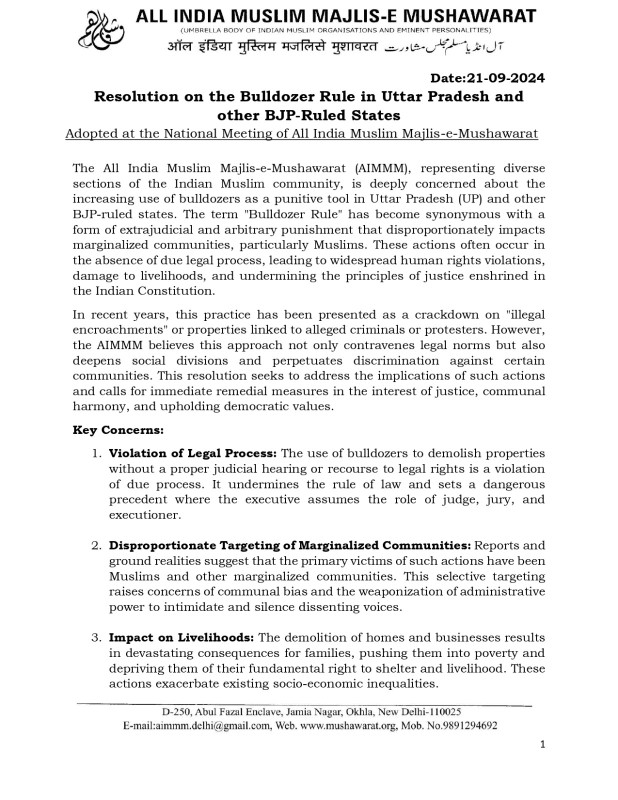
Adopted at the National Meeting of All India Muslim Majlis-e-Mushawarat Date: 21st September, 2024 The All India Muslim Majlis-e-Mushawarat (AIMMM), representing diverse sections of the Indian Muslim community, is deeply concerned about the increasing use of bulldozers as a punitive tool in Uttar Pradesh (UP) and other BJP-ruled states. The term “Bulldozer Rule” has become synonymous with a form of extrajudicial and arbitrary punishment that disproportionately impacts marginalized communities, particularly Muslims. These actions often occur in the absence of due legal process, leading to widespread human rights violations, damage to livelihoods, and undermining the principles of justice enshrined in the Indian Constitution. In recent years, this practice has been presented as a crackdown on “illegal encroachments” or properties linked to alleged criminals or protesters. However, the AIMMM believes this approach not only contravenes legal norms but also deepens social divisions and perpetuates discrimination against certain communities. This resolution seeks to address the implications of such actions and calls for immediate remedial measures in the interest of justice, communal harmony, and upholding democratic values. Key Concerns: Impact on Livelihoods: The demolition of homes and businesses results in devastating consequences for families, pushing them into poverty and depriving them of their fundamental right to shelter and livelihood. These actions exacerbate existing socio-economic inequalities. Demands: Conclusion: The AIMMM, while committed to the ideals of national unity and social harmony, cannot remain silent in the face of injustices and violations of constitutional rights. The “Bulldozer Rule” represents a dangerous shift towards authoritarianism and arbitrary state power, and it is our collective responsibility to resist such actions that harm the fabric of Indian democracy. We stand firmly with the victims of these demolitions and demand that justice be served. Let us work towards a future where every citizen, regardless of religion or background, can live with dignity, security, and equality before the law. Place: New Delhi
Resolution on CBSE draconian anti Urdu policies.
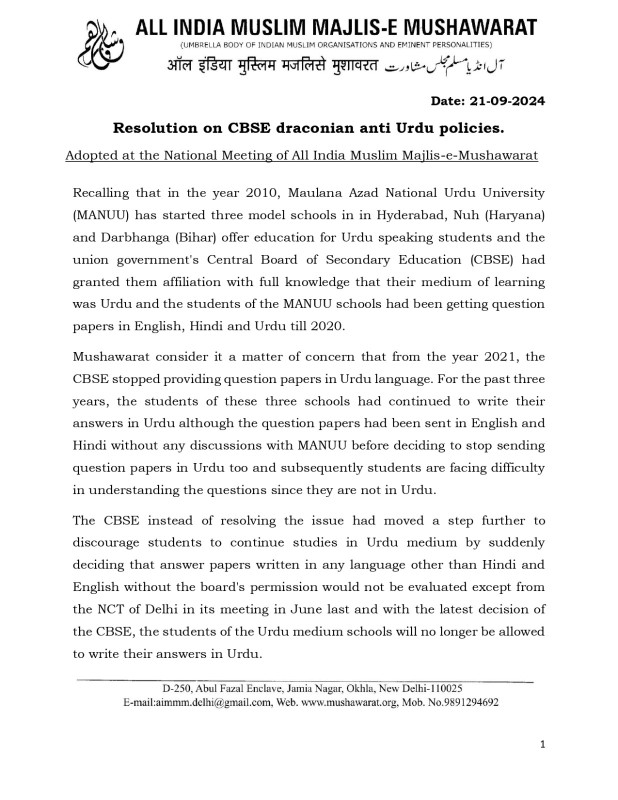
Adopted at the National Meeting of All India Muslim Majlis-e-Mushawarat Date: 21st September, 2024 Recalling that in the year 2010, Maulana Azad National Urdu University (MANUU) has started three model schools in in Hyderabad, Nuh (Haryana) and Darbhanga (Bihar) offer education for Urdu speaking students and the union government’s Central Board of Secondary Education (CBSE) had granted them affiliation with full knowledge that their medium of learning was Urdu and the students of the MANUU schools had been getting question papers in English, Hindi and Urdu till 2020. Mushawarat consider it a matter of concern that from the year 2021, the CBSE stopped providing question papers in Urdu language. For the past three years, the students of these three schools had continued to write their answers in Urdu although the question papers had been sent in English and Hindi without any discussions with MANUU before deciding to stop sending question papers in Urdu too and subsequently students are facing difficulty in understanding the questions since they are not in Urdu. The CBSE instead of resolving the issue had moved a step further to discourage students to continue studies in Urdu medium by suddenly deciding that answer papers written in any language other than Hindi and English without the board’s permission would not be evaluated except from the NCT of Delhi in its meeting in June last and with the latest decision of the CBSE, the students of the Urdu medium schools will no longer be allowed to write their answers in Urdu. It is a matter of further concern that the Urdu medium schools in different parts of the country including even those started by MANUU which is a central university and gets grants from union ministry of Human Resources are facing difficulties in ensuring educational empowerment to students in their mother tongue because of the irrational decision of the CBSE to disallow students to continue their studies. Therefore, All India Muslim Majlis e Mushawarat demand immediate withdrawal of the draconian decision of CBSE and restoring the previous policy to allow students to write answers in Urdu language. Mushawarat also appeals for urgent intervention of the union minister for Education to direct the CBSE Board to scrap its policy to disallow Urdu medium students to write exams in Urdu language. (Proposed by Navaid Hamid)
Resolution on international community’s concern on the targeted crimes agains the Indian minorities
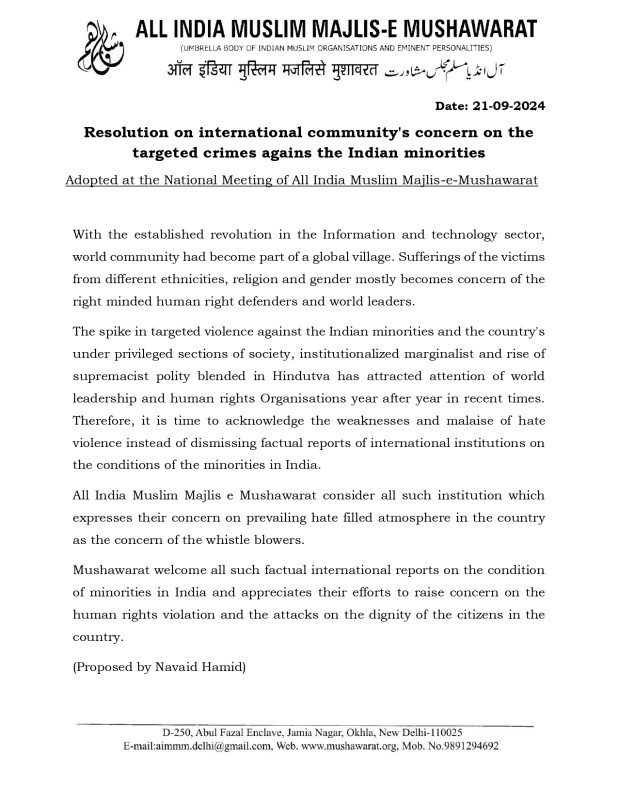
Adopted at the National Meeting of All India Muslim Majlis-e-Mushawarat With the established revolution in the Information and technology sector, world community had become part of a global village. Sufferings of the victims from different ethnicities, religion and gender mostly becomes concern of the right minded human right defenders and world leaders. The spike in targeted violence against the Indian minorities and the country’s under privileged sections of society, institutionalized marginalist and rise of supremacist polity blended in Hindutva has attracted attention of world leadership and human rights Organisations year after year in recent times. Therefore, it is time to acknowledge the weaknesses and malaise of hate violence instead of dismissing factual reports of international institutions on the conditions of the minorities in India. All India Muslim Majlis e Mushawarat consider all such institution which expresses their concern on prevailing hate filled atmosphere in the country as the concern of the whistle blowers. Mushawarat welcome all such factual international reports on the condition of minorities in India and appreciates their efforts to raise concern on the human rights violation and the attacks on the dignity of the citizens in the country. (Proposed by Navaid Hamid) Full Coverage & Credits
قومی کونسل برائے فروغ اردو زبان میں موجود تعطل پر آل انڈیا مسلم مجلس مشاورت کے اجلاس میں منظور شدہ قرار داد
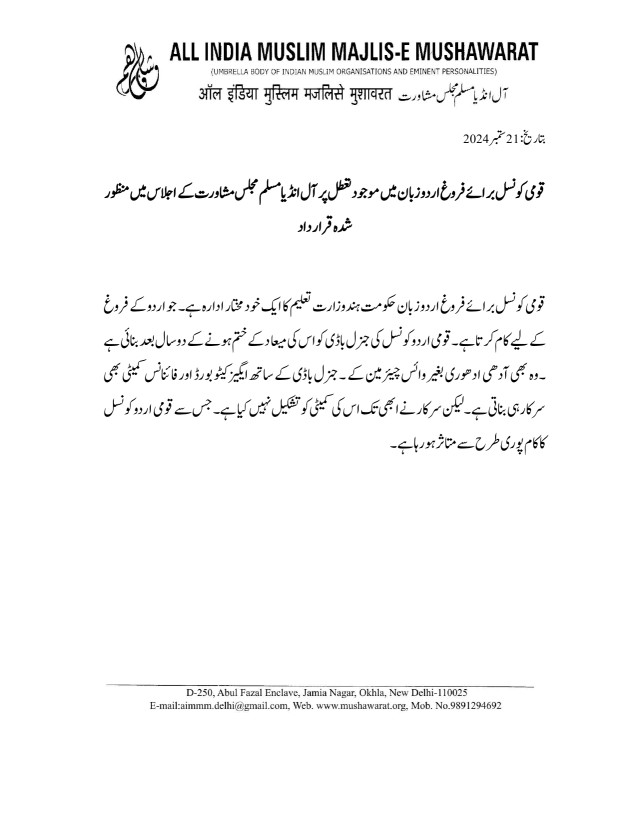
تاریخ:21 ستمبر2024 قومی کونسل برائے فروغ اردو زبان حکومت ہند وزارت تعلیم کا ایک خود مختار ادارہ ہے۔ جو اردو کے فروغ کے لیے کام کرتا ہے۔ قومی اردو کونسل کی جنرل باڈی کو اس کی میعا د کے ختم ہونے کے دو سال بعد بنائی ہے ۔وہ بھی آدھی ادھوری بغیر وائس چیئرمین کے ۔ جنرل باڈی کے ساتھ ایگیزکیٹو بورڈ اور فائنانس کمیٹی بھی سرکار ہی بناتی ہے۔لیکن سرکار نے ابھی تک اس کی کمیٹی کو تشکیل نہیں کیا ہے۔ جس سے قومی اردو کونسل کا کام پوری طرح سے متاثر ہورہا ہے۔ Full Coverage & Credits
Resolution on Jammu & Kashmir
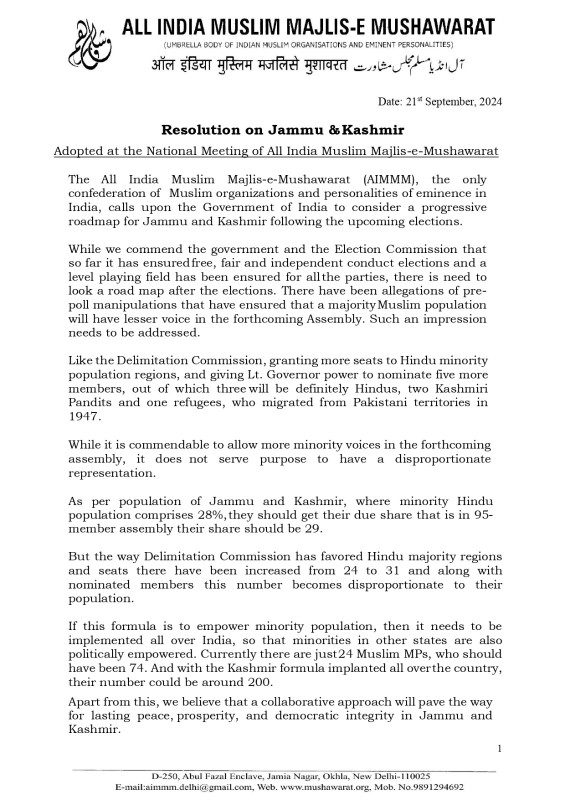
Adopted at the National Meeting of All India Muslim Majlis-e-Mushawarat Date: 21st September, 2024 The All India Muslim Majlis-e-Mushawarat (AIMMM), the only confederation of Muslim organizations and personalities of eminence in India, calls upon the Government of India to consider a progressive roadmap for Jammu and Kashmir following the upcoming elections. While we commend the government and the Election Commission that so far it has ensured free, fair and independent conduct elections and a level playing field has been ensured for all the parties, there is need to look a road map after the elections. There have been allegations of pre-poll manipulations that have ensured that a majority Muslim population will have lesser voice in the forthcoming Assembly. Such an impression needs to be addressed. Like the Delimitation Commission, granting more seats to Hindu minority population regions, and giving Lt. Governor power to nominate five more members, out of which three will be definitely Hindus, two Kashmiri Pandits and one refugees, who migrated from Pakistani territories in 1947. While it is commendable to allow more minority voices in the forthcoming assembly, it does not serve purpose to have a disproportionate representation. As per population of Jammu and Kashmir, where minority Hindu population comprises 28%, they should get their due share that is in 95-member assembly their share should be 29. But the way Delimitation Commission has favored Hindu majority regions and seats there have been increased from 24 to 31 and along with nominated members this number becomes disproportionate to their population. If this formula is to empower minority population, then it needs to be implemented all over India, so that minorities in other states are also politically empowered. Currently there are just 24 Muslim MPs, who should have been 74. And with the Kashmir formula implanted all over the country, their number could be around 200. Apart from this, we believe that a collaborative approach will pave the way for lasting peace, prosperity, and democratic integrity in Jammu and Kashmir. We recommend: 1. Restoration of Statehood: Immediate Action: Reinstate Jammu and Kashmir’s status as a full-fledged state to honor the aspirations of its people. Rationale: Statehood will empower local institutions and facilitate better governance aligned with the unique needs of the region. 2. Empowerment of the Elected Government: Reduce Governor’s Powers: Limit the administrative powers of the Governor to allow the elected government to function effectively. Strengthen Democracy: Ensuring that elected representatives have the authority to make decisions will reinforce democratic values. 3. Reduction of Surveillance: Scale Back Monitoring: Reevaluate and reduce excessive surveillance measures imposed on the populace. Promote Trust: Alleviating the atmosphere of scrutiny will help rebuild trust between citizens and authorities. 4. Restoration of Political Freedom: Release Detainees: Free political leaders and activists who have been detained without substantial charges. Encourage Dialogue: Open political space is essential for healthy discourse and conflict resolution. 5. Freedom of the Press: Lift Media Restrictions: Remove limitations imposed on local and national media in the region. Ensure Transparency: A free press is vital for accountability and informed citizenry. 6. Socio-Economic Development: Invest in Infrastructure: Prioritize projects that generate employment and improve living standards. Inclusive Growth: Economic development should benefit all communities, fostering unity and progress. 1. Community Engagement: Promote Civil Society Initiatives: Support organizations working towards social cohesion and peace-building. Educational Programs: Encourage educational exchanges and programs that bridge cultural and communal gaps. The AIMMM stand committed to the welfare of Jammu and Kashmir and believes that these steps are crucial for creating a harmonious and prosperous future. We urge the government to take these recommendations into serious consideration and work collaboratively with all stakeholders. We envision a Jammu and Kashmir where: Communities live together in peace, mutual respect, and understanding. Every individual enjoys fundamental rights and freedoms. Democratic institutions function without undue interference. The media operates freely, contributing to transparency and accountability. The All India Muslim Majlis-e-Mushawarat is dedicated to promoting justice, democracy, and communal harmony throughout India. We believe in constructive dialogue and collaboration to address the challenges facing our nation. (Proposed by: Mr. Iftikhar Gilani)
جموں و کشمیر پر قرارداد
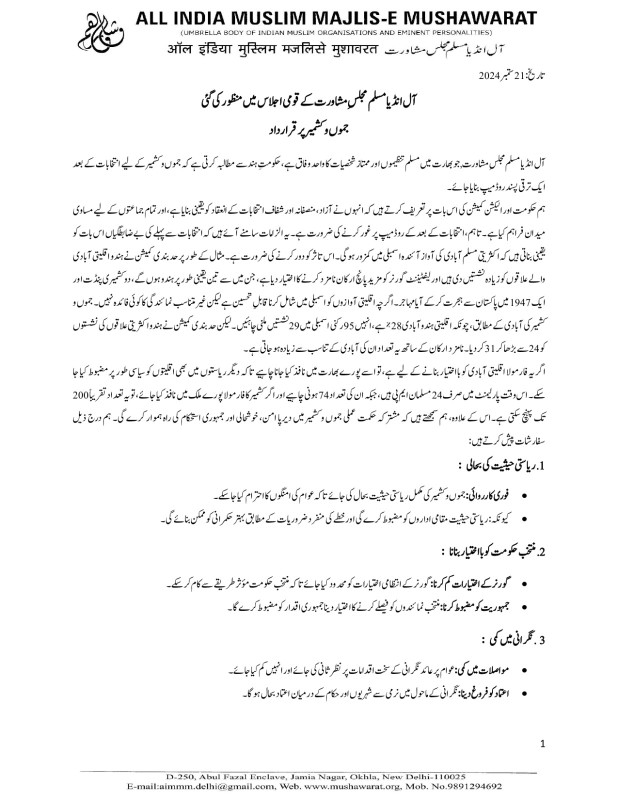
آل انڈیا مسلم مجلسِ مشاورت کے قومی اجلاس میں منظور کی گئی تاریخ:21 ستمبر2024 آل انڈیا مسلم مجلسِ مشاورت,جو بھارت میں مسلم تنظیموں اور ممتاز شخصیات کا واحد وفاق ہے، حکومتِ ہند سے مطالبہ کرتی ہے کہ جموں و کشمیر کے لیے انتخابات کے بعد ایک ترقی پسند روڈ میپ بنایا جائے۔ ہم حکومت اور الیکشن کمیشن کی اس بات پر تعریف کرتے ہیں کہ انہوں نے آزاد، منصفانہ اور شفاف انتخابات کے انعقاد کو یقینی بنایا ہے، اور تمام جماعتوں کے لیے مساوی میدان فراہم کیا ہے۔ تاہم، انتخابات کے بعد کے روڈ میپ پر غور کرنے کی ضرورت ہے۔ یہ الزامات سامنے آئے ہیں کہ انتخابات سے پہلے کی بے ضابطگیاں اس بات کو یقینی بناتی ہیں کہ اکثریتی مسلم آبادی کی آواز آئندہ اسمبلی میں کمزور ہوگی۔ اس تاثر کو دور کرنے کی ضرورت ہے۔ مثال کے طور پر حد بندی کمیشن نے ہندو اقلیتی آبادی والے علاقوں کو زیادہ نشستیں دی ہیں اور لیفٹیننٹ گورنر کو مزید پانچ ارکان نامزد کرنے کا اختیار دیا ہے، جن میں سے تین یقینی طور پر ہندو ہوں گے، دو کشمیری پنڈت اور ایک 1947 میں پاکستان سے ہجرت کر کے آیا مہاجر۔اگرچہ اقلیتی آوازوں کو اسمبلی میں شامل کرنا قابلِ تحسین ہے لیکن غیر متناسب نمائندگی کا کوئی فائدہ نہیں۔ جموں و کشمیر کی آبادی کے مطابق، چونکہ اقلیتی ہندو آبادی 28% ہے، انہیں 95 رکنی اسمبلی میں 29 نشستیں ملنی چاہئیں۔ لیکن حد بندی کمیشن نے ہندو اکثریتی علاقوں کی نشستوں کو 24 سے بڑھا کر 31 کر دیا۔ نامزد ارکان کے ساتھ یہ تعداد ان کی آبادی کے تناسب سے زیادہ ہو جاتی ہے۔ اگر یہ فارمولا اقلیتی آبادی کو بااختیار بنانے کے لیے ہے، تو اسے پورے بھارت میں نافذ کیا جانا چاہیے تاکہ دیگر ریاستوں میں بھی اقلیتوں کو سیاسی طور پر مضبوط کیا جا سکے۔ اس وقت پارلیمنٹ میں صرف 24 مسلمان ایم پی ہیں، جبکہ ان کی تعداد 74 ہونی چاہیے اور اگر کشمیر کا فارمولا پورے ملک میں نافذ کیا جائے، تو یہ تعداد تقریباً 200 تک پہنچ سکتی ہے۔اس کے علاوہ، ہم سمجھتے ہیں کہ مشترکہ حکمت عملی جموں و کشمیر میں دیرپا امن، خوشحالی اور جمہوری استحکام کی راہ ہموار کرے گی۔ ہم درج ذیل سفارشات پیش کرتے ہیں: ریاستی حیثیت کی بحالی فوری کارروائی: جموں و کشمیر کی مکمل ریاستی حیثیت بحال کی جائے تاکہ عوام کی امنگوں کا احترام کیا جا سکے۔ کیونکہ: ریاستی حیثیت مقامی اداروں کو مضبوط کرے گی اور خطے کی منفرد ضروریات کے مطابق بہتر حکمرانی کو ممکن بنائے گی۔ منتخب حکومت کو بااختیار بنانا: گورنر کے اختیارات کم کرنا: گورنر کے انتظامی اختیارات کو محدود کیا جائے تاکہ منتخب حکومت مؤثر طریقے سے کام کر سکے۔ جمہوریت کو مضبوط کرنا: منتخب نمائندوں کو فیصلے کرنے کا اختیار دینا جمہوری اقدار کو مضبوط کرے گا۔ نگرانی میں کمی: مواصلات میں کمی: عوام پر عائد نگرانی کے سخت اقدامات پر نظرثانی کی جائے اور انہیں کم کیا جائے۔ اعتماد کو فروغ دینا: نگرانی کے ماحول میں نرمی سے شہریوں اور حکام کے درمیان اعتماد بحال ہوگا۔ سیاسی آزادی کی بحالی: قیدیوں کی رہائی: ان سیاسی رہنماؤں اور کارکنوں کو رہا کیا جائے جنہیں بغیر کسی ٹھوس ثبوت کے حراست میں لیا گیا ہے۔ مذاکرات کی حوصلہ افزائی: صحت مند مباحثے اور تنازعات کے حل کے لیے کھلی سیاسی فضا کا ہونا ضروری ہے۔ پریس کی آزادی: میڈیا پر پابندیوں خاتمہ: خطے میں مقامی اور قومی میڈیا پر عائد پابندیاں ختم کی جائیں۔ شفافیت کو یقینی بنانا: آزاد میڈیا احتساب اور باخبر شہریت کے لیے ناگزیر ہے۔ سماجی و اقتصادی ترقی: انفراسٹرکچر میں سرمایہ کاری: ان منصوبوں کو ترجیح دی جائے جو روزگار پیدا کریں اور عوام کے معیارِ زندگی کو بہتر بنائیں۔ ہمہ گیر ترقی: اقتصادی ترقی کا فائدہ تمام کمیونٹیز کو ہونا چاہیے تاکہ اتحادواتفاق اور ترقی کو فروغ دیاجاسکے۔ کمیونٹی کی شمولیت: سول سوسائٹی کی کوششوں کو فروغ دینا: ان تنظیموں کی حمایت کی جائے جو سماجی ہم آہنگی اور امن کے فروغ کے لیے کام کر رہی ہیں۔ تعلیمی پروگرام: ایسے تعلیمی تبادلے اور پروگراموں کو فروغ دیا جائے جو ثقافتی اور سماجی تفریق کو کم کریں۔ آل انڈیا مسلم مجلس مشاورت جموں و کشمیر کی فلاح و بہبود کے لیے پرعزم ہے اور سمجھتی ہے کہ یہ اقدامات ایک پرامن اور خوشحال مستقبل کے لیے نہایت ضروری ہیں۔ ہم حکومت سے مطالبہ کرتے ہیں کہ ان سفارشات پر سنجیدگی سے غور کرے اور تمام متعلقہ فریقوں کے ساتھ مل کر کام کرے۔ ہم جموں و کشمیر کا ایک ایسا منظرنامہ دیکھتے ہیں جہاں: ہر فرد کو بنیادی حقوق اور آزادی حاصل ہو۔ جمہوری ادارے بغیر کسی مداخلت کے کام کریں۔ میڈیا آزادی سے کام کرے اور شفافیت اور احتساب میں اپنا کردار ادا کرے۔ تمام کمیونٹیز امن، باہمی احترام اور افہام و تفہیم کے ساتھ رہیں۔ آل انڈیا مسلم مجلسِ مشاورت پورے بھارت میں انصاف، جمہوریت اور فرقہ وارانہ ہم آہنگی کو فروغ دینے کے لیے پرعزم ہے۔ ہم سمجھتے ہیں کہ تعمیری مکالمہ اور تعاون ہماری قوم کو درپیش چیلنجوں کا حل فراہم کر سکتے ہیں۔ (پیش کردہ: جناب افتخار گیلانی) Full Coverage & Credits
